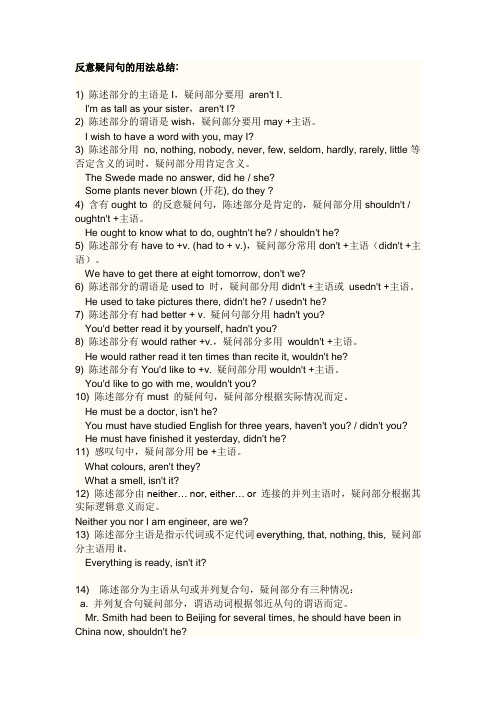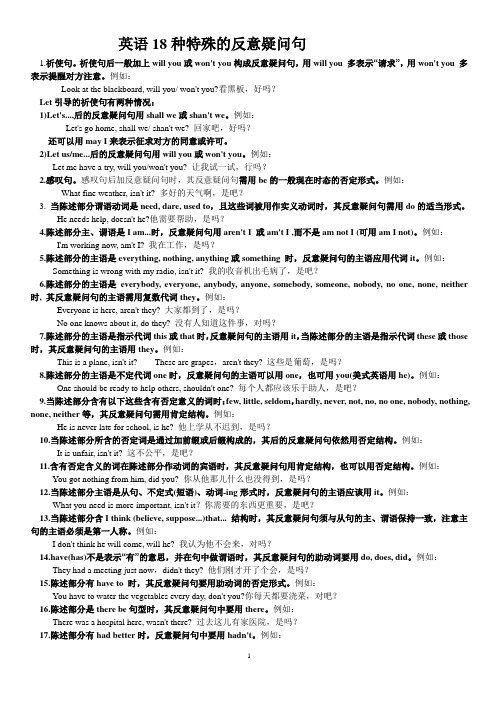18种特殊反义疑问句
反义疑问句专项讲解

18、陈述部分有would rather + v.疑问部分 多用 wouldn't +主语。
2. 感叹句。感叹句后加反意疑问句时,其反意疑问 句需用be 的一般现在时态的否定形式。 例如:What fine weather, isn’t it ?多好的天气啊, 是吧? (What beautiful flowers, aren’t they ?) 3.陈述部分主、谓语是I am … 时,反意疑问句用 aren’t I。 例如:I am working now, aren’t I? 我在工作,是吗? 4.陈述部分的主语是everything ,nothing,anything 或 something时,反意疑问句的主语应用代词it 。 例如:Something is wrong with my radio, isn’t it ? 我的收音机出毛病了,是吗?
反义疑问句遵循前肯后否,前否 后肯的规则。即前面是肯定句, 后面就是否定句。前面是否定句, 后面就是肯定句。
下面让我们来看一些特殊的 反义疑问句
反意疑问句的用法
1. 祈使句。祈使句后一般加上will you 或 won’t you 构成反意疑问句,用will you 多表示 “请求”,用won’t you多表示提醒对方注意。例 如:Look at the blackboard , will you?看黑板,好吗? ( Don’t open the door, will you ?) Let 引导的祈使句有两种情况: a) Let’s … , 后的反意疑问句用shall we 或shan’t we。 例如:Let’s go home ,shall we ?回家吧,好吗?(还 可以用may I来表示征求对方的同意或许可。) b) Let us /me…后的反意疑问句用will you。例如: Let me have a try ,will you ?让我试一试,行吗?
反义疑问句的例句

反义疑问句的例句反义疑问句是英语语法中常用的一种疑问句形式。
它由一个陈述句和一个简略的疑问句构成,用于询问对方是否同意或不同意陈述句的内容。
1. He's not going to the party, is he?2. You don't like coffee, do you?3. They won't be late, will they?4. She can swim, can't she?5. He didn't finish his homework, did he?6. You haven't seen the movie, have you?7. She will call you later, won't she?8. He shouldn't eat too much, should he?9. They couldn't find the keys, could they?10. You haven't been to Paris, have you?11. She isn't coming with us, is she?12. You won't forget to pick up the groceries, will you?13. He doesn't know the answer, does he?14. They didn't win the game, did they?15. You can't speak French, can you?16. She hasn't finished her work, has she?17. He will be on time, won't he?18. They shouldn't eat junk food, should they?19. You couldn't find your passport, could you?20. She isn't feeling well today, is she?21. He has never been to Japan, has he?22. You won't be late for the meeting, will you?23. They didn't enjoy the concert, did they?24. She doesn't like spicy food, does she?25. He hasn't watched the movie, has he?26. You will help me with the project, won't you?27. She shouldn't drive in that condition, should she?28. They couldn't solve the problem, could they?29. You haven't finished reading the book, have you?30. She isn't going on vacation, is she?31. He didn't invite her to the party, did he?32. You don't need any help, do you?33. They won't miss the train, will they?34. She can play the piano, can't she?35. He didn't attend the meeting, did he?36. You haven't seen that TV show, have you?37. She will pass the exam, won't she?38. They shouldn't drink alcohol and drive, should they?39. You couldn't find your keys, could you?40. She isn't interested in sports, is she?以上是一些常见的反义疑问句的例句,可以帮助你更好地理解和运用这种语法结构。
2019年英语高考一轮复习语法知识大全反义疑问句

一、概说反意疑问句附在陈述句之后,对陈述句所说的事实或观点提出疑问。
可以表示真实的疑问,也可以表示说话者的某种倾向、强调或反问。
反意疑问句有前后两个部分,若前一部分为肯定式,后一部分一般用否定式;若前一部分为否定式,后一部分一般用肯定式。
这种疑问句由be、have及助动词和情态动词加主语构成,前有逗号,后有问号,句末常用升调,其答语一般须用yes或no。
二、陈述句谓语动词为have的反意疑问句。
1、当have表示“有”时可用have或do两种形式反意。
如:He has a sister, hasn’t he (doesn’t he)?He doesn’t have a sister, does he? (不可用has he,因为前面用的是doesn’t)2、当have不表示“有”而作为行为动词表示“吃、得到、经历、遭受”时,疑问部分只用do的适当形式。
如:He has breakfast, doesn’t he?The weak boy often has coughs, doesn’t he?3、当陈述句谓语动词含有have to、has to、had to时,疑问部分用do的适当形式,虽然have got to 和have to含义相同,但疑问部分要用have的适当形式。
如:We have to walk back, don’t we?They had to obey the rules, didn’t they?I have got to tell it to your mother, haven’t I?三、特殊类型的反意疑问句。
1、当陈述句谓语动词为系动词、助动词和情态动词时,疑问部分要重复这些动词。
如:He is brave, isn’t he?I am strong, aren’t I (ain’t I)?She will get married, won’t she?You can help her, can’t you?注意:陈述句若是I am…结构,疑问部分要用aren’t I、ain’t I或am I not(正式),而不用am not I。
反义疑问句的用法总结与练习

反意疑问句的用法总结:1) 陈述部分的主语是I,疑问部分要用aren't I.I'm as tall as your sister,aren't I?2) 陈述部分的谓语是wish,疑问部分要用may +主语。
I wish to have a word with you, may I?3) 陈述部分用no, nothing, nobody, never, few, seldom, hardly, rarely, little等否定含义的词时,疑问部分用肯定含义。
The Swede made no answer, did he / she?Some plants never blown (开花), do they ?4) 含有ought to 的反意疑问句,陈述部分是肯定的,疑问部分用shouldn't / oughtn't +主语。
He ought to know what to do, oughtn't he? / shouldn't he?5) 陈述部分有have to +v. (had to + v.),疑问部分常用don't +主语(didn't +主语)。
We have to get there at eight tomorrow, don't we?6) 陈述部分的谓语是used to 时,疑问部分用didn't +主语或usedn't +主语。
He used to take pictures there, didn't he? / usedn't he?7) 陈述部分有had better + v. 疑问句部分用hadn't you?You'd better read it by yourself, hadn't you?8) 陈述部分有would rather +v.,疑问部分多用wouldn't +主语。
反义疑问句用法(最新全)

反义疑问句用法(最新全)1、当陈述句的主语为anybody, anyone, everybody, everyone, somebody, someone, nobody, noone时,反意疑问句的主语用they。
但亦可用he,尤其是nobody, no one等作主语,具有否定概念时。
如:如:Somebody phone d while I was out, didn’t they?Everyone enjoyed the party, didn’t they?Nobody wants to go there, does he?Nobody says a word about the incident, don’t they?Somebody borrowed your bike yesterday, didn’t they?Anybody can do it, can’t they?2、当陈述部分的主语是I,而句子又用来征询对方的意见时,附加疑问句中的主语用you。
如:如:I find Engli sh very interesting, don’t you?I don’t li ke that film, do you?3、当陈述句的主语为everything, anything, nothing, something等时,反意疑问句的主语用it.如:Everything is all right, isn’t it?Nothing can stop us going forward, can it?4、当陈述部分的主语是指示代词this, that或these, those时,附加疑问句中的主语分别用it和they。
如:This is important, isn’t it?That isn’t correct, is it?These are your fri ends Tom and Jack, aren’t they?5、当陈述句的主语为one时, 反意疑问句的主语在正式情况下用one;在非正式情况下用you.如:One should learn from others, shouldn’t one / you?One can’t be one’s own master, can one?One can not be too careful, can one?6、当陈述句的谓语部分含有had better, would rather, would like, ought to时, 反意疑问句的谓语应用相应的助动词。
反义疑问句句型归纳

反义疑问句句型归纳1、You had no time for reading, did you \ had you?2、He has a bro ther, hasn’t he, \ doesn’t he?3、We have to go without him, don’t we ?4、You have you r dinner at school, don’t you?5、He has a res t every two hours, doesn’t he?6、This is your last chance to learn from the beginning, isn’t it?7、Those were terrible days f or us to recall, weren’t they?8、There are some books you ar e interested in, aren’t there?9、Let us do it as we please \ like to, will you \ can you?10、Let’s us do it right now, shall we \ can we?11、Come here, will you \ won’t you \ can you \ c an’t you \ do you \ don’t you?12、Don’t say anything, will you \ can you \ do you?13、Tom, you clean the window, will you?14、I think \ say \suppose \ guess \ am sure he will come back soon, won’t he?15、I don’t think he will come back , will he?16、He old man never thought he was lonely, did he?17、The old man used to be a f armer, usedn’t he \ didn’t he?18、He ought to come, oughtn’t he \ shouldn’t?19、He seldom goes to the c inema, doesn’t he?( hardly, never, few, little, nothing, nobody)20、It’s unfair, isn’t it?21、One can’t be car eful enough, can one \ can he?22、Eve rything goes well, doesn’t it?23、Everybody agrees with him, doesn’t he \ don’t they?24、All we needed has been bought, hasn’t it?25、All we invited have arrived, haven’t they(All refers to people)26、Learning E nglish is very hard, isn’t it?27、He studies hard and he is often prai sed by his teachers, isn’t he?28、We must be more polite in this occasion, needn’t we?29、He must be a brave man, isn’t he?30、It must have rained last night, didn’t it?31、He mush hav e known the answer, hasn’t he?32、He can’t have done such a foolish thing, has he?33、I am a student, aren’t I ?34、So he has known the secret, has he?35、Oh, you have the same type of sell phone as I, do you一、反意疑问句的意义及其构成反意疑问句又叫附加疑问句,是指当提问的人对前面所叙述的事实不敢肯定,而需要向对方加以证实时所提出的问句。
十八种特殊的反义疑问句

英语18种特殊的反意疑问句1.祈使句。
祈使句后一般加上will you或won't you构成反意疑问句,用will you 多表示“请求”,用won't you 多表示提醒对方注意。
例如:Look at the blackboard, will you/ won't you?看黑板,好吗?Let引导的祈使句有两种情况:1)Let's...,后的反意疑问句用shall we或shan't we。
例如:Let's go home, shall we/ shan't we? 回家吧,好吗?还可以用may I来表示征求对方的同意或许可。
2)Let us/me...后的反意疑问句用will you或won't you。
例如:Let me have a try, will you/won't you? 让我试一试,行吗?2.感叹句。
感叹句后加反意疑问句时,其反意疑问句需用be的一般现在时态的否定形式。
例如:What fine weather, isn't it? 多好的天气啊,是吧?3. 当陈述部分谓语动词是need, dare, used to,且这些词被用作实义动词时,其反意疑问句需用do的适当形式。
He needs help, doesn't he?他需要帮助,是吗?4.陈述部分主、谓语是I am...时,反意疑问句用aren't I 或am't I ,而不是am not I (可用am I not)。
例如:I'm working now, am't I? 我在工作,是吗?5.陈述部分的主语是everything, nothing, anything或something 时,反意疑问句的主语应用代词it。
例如:Something is wrong with my radio, isn't it? 我的收音机出毛病了,是吧?6.陈述部分的主语是everybody, everyone, anybody, anyone, somebody, someone, nobody, no one, none, neither 时, 其反意疑问句的主语需用复数代词they。
初中考试常见反义疑问句的用于解析及其试题类型参考

1.祈使句。
祈使句后一般加上will you或won't you构成反意疑问句,will you多表示请求,won't you多表示提醒对方。
陈述部分为否定的祈使句时,用will you。
例如:Look at the blackboard, will you/ won't you?看黑板,好吗?Let引导的祈使句有两种情况:1)Let's...,后的反意疑问句用shall we或shan't we。
例如:Let's go home, shall we/ shan't we? 回家吧,好吗?还可以用may I来表示征求对方的同意或许可。
2)Let us/me...后的反意疑问句用will you或won't you。
例如:Let me have a try, will you/won't you? 让我试一试,行吗?2.感叹句。
感叹句后加反意疑问句时,其反意疑问句需用be的一般现在时态的否定形式。
例如:What fine weather, isn't it? 多好的天气啊,是吧?3. 当陈述部分谓语动词是need, dare, used to,且这些词被用作实义动词时,其反意疑问句需用do的适当形式。
若dare和need 为情态动词,疑问部分用dare 或need构成。
例如:We need to help them, don’t we?You daren’t go there, dare you?4.陈述部分主、谓语是I am...时,反意疑问句用aren't I 或ain't I ,而不是am not I (可用am I not)。
例如:I'm working now, ain't I? 我在工作,是吗?5.陈述部分的主语是everything, nothing, anything或something 时,反意疑问句的主语应用代词it。
- 1、下载文档前请自行甄别文档内容的完整性,平台不提供额外的编辑、内容补充、找答案等附加服务。
- 2、"仅部分预览"的文档,不可在线预览部分如存在完整性等问题,可反馈申请退款(可完整预览的文档不适用该条件!)。
- 3、如文档侵犯您的权益,请联系客服反馈,我们会尽快为您处理(人工客服工作时间:9:00-18:30)。
初中英语18种特殊的反意疑问句
1.祈使句。
祈使句后一般加上will you或won't you构成反意疑问句,用will you 多
表示“请求”,用won't you 多表示提醒对方注意。
例如:Look at the blackboard, will you/ won't you?看黑板,好吗?
Let引导的祈使句有两种情况:
1)Let's...,后的反意疑问句用shall we或shan't we。
例如:
Let's go home, shall we/ shan't we? 回家吧,好吗?
还可以用may I来表示征求对方的同意或许可。
2)Let us/me...后的反意疑问句用will you或won't you。
例如:
Let me have a try, will you/won't you? 让我试一试,行吗?
2.感叹句。
感叹句后加反意疑问句时,其反意疑问句需用be的一般现在时态的否定形式。
例如:
What fine weather, isn't it? 多好的天气啊,是吧?
3. 当陈述部分谓语动词是need, dare, used to,且这些词被用作实义动词时,其反意疑问句需用do的适当形式。
例如:
He needs help, doesn't he?他需要帮助,是吗?
4.陈述部分主、谓语是I am...时,反意疑问句用aren't I 或ain't I ,而不是am not I (可用am I not)。
例如:
I'm working now, ain't I? 我在工作,是吗?
5.陈述部分的主语是everything, nothing, anything或something 时,反意疑问句的主语应用代词it。
例如:
Something is wrong with my radio, isn't it? 我的收音机出毛病了,是吧?
6.陈述部分的主语是everybody, everyone, anybody, anyone, somebody, someone, nobody, no one, none, neither 时, 其反意疑问句的主语需用复数代词they。
例如:
Everyone is here, aren't they? 大家都到了,是吗?
No one knows about it, do they? 没有人知道这件事,对吗?
7.陈述部分的主语是指示代词this或that时,反意疑问句的主语用it,当陈述部分的主语是指示代词these或those时,其反意疑问句的主语用they。
例如:This is a plane, isn't it? 这是一架飞机,是吗?
These are grapes,aren't they? 这些是葡萄,是吗?
8.陈述部分的主语是不定代词one时,反意疑问句的主语可以用one,也可用you(美式英语用he)。
例如:
One should be ready to help others, shouldn't one? 每个人都应该乐于助人,是吧?
9.当陈述部分含有以下这些含有否定意义的词时:few, little, seldom,hardly, never, not, no, no one, nobody, nothing, none, neither等,其反意疑问句需用肯定结构。
例如:
He is never late for school, is he? 他上学从不迟到,是吗?
10.当陈述部分所含的否定词是通过加前缀或后缀构成的,其后的反意疑问句依然用否定结构。
例如:
It is unfair, isn't it? 这不公平,是吧?
11.含有否定含义的词在陈述部分作动词的宾语时,其反意疑问句用肯定结构,也可以用否定结构。
例如:
You got nothing from him, did you? 你从他那儿什么也没得到,是吗?
12.当陈述部分主语是从句、不定式(短语)、动词-ing形式时,反意疑问句的主语应该用it。
例如:
What you need is more important, isn't it?你需要的东西更重要,是吧?13.当陈述部分含I think (believe, suppose...)that... 结构时,其反意疑问句须与从句的主、谓语保持一致,注意主句的主语必须是第一人称。
例如:
I don't think he will come, will he? 我认为他不会来,对吗?
14.have(has)不是表示“有”的意思,并在句中做谓语时,其反意疑问句的助动词要用do, does, did。
例如:
They had a meeting just now,didn't they? 他们刚才开了个会,是吗?
15.陈述部分有have to 时,其反意疑问句要用助动词的否定形式。
例如:
You have to water the vegetables every day, don't you?你每天都要浇菜,对吧?
16.陈述部分是there be句型时,其反意疑问句中要用there。
例如:
There was a hospital here, wasn't there? 过去这儿有家医院,是吗?
17.陈述部分有had better时,反意疑问句中要用hadn't。
例如:
We had better go to school at once, hadn't we? 我们现在最好马上去上学,好吗?
18.当陈述部分含有情态动词must时,我们便要分析一下must的含义。
如果must 作“一定;要;必须”讲,反意疑问句须用mustn't或needn't;而当must作推测意义“一定是;必定”讲时,反意疑问句则需根据must后的动词原形选用相应的形式。
例如:
He must work hard at physics, mustn't he? 他必须努力学物理,是吧?
Tom must be at home,isn't he? 汤姆一定在家,是吧?。
